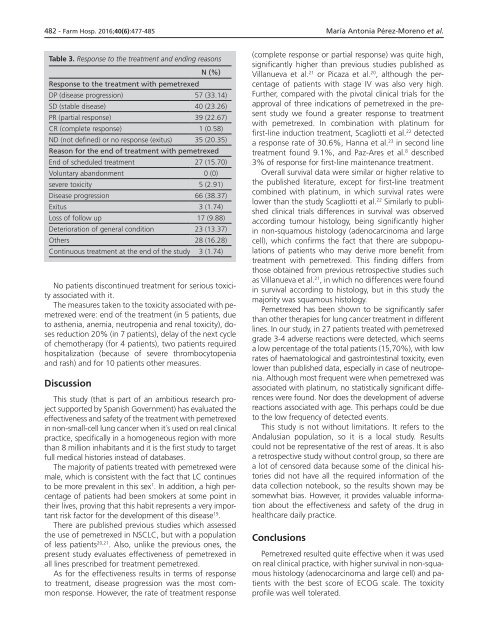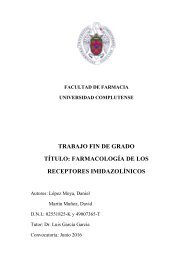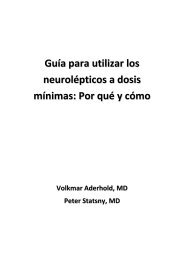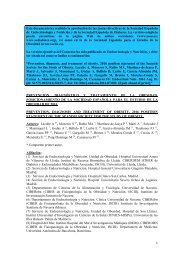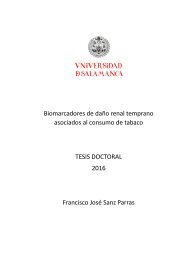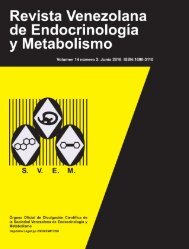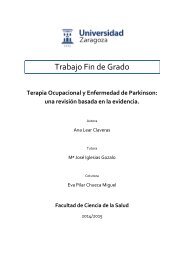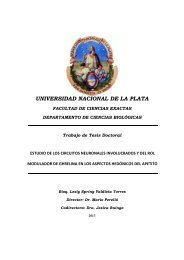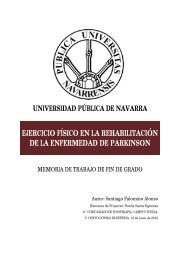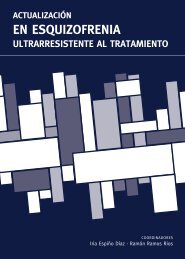Noviembre-Diciembre
156_v40n6(1)
156_v40n6(1)
Create successful ePaper yourself
Turn your PDF publications into a flip-book with our unique Google optimized e-Paper software.
482 - Farm Hosp. 2016;40(6):477-485 María Antonia Pérez-Moreno et al.<br />
Table 3. Response to the treatment and ending reasons<br />
N (%)<br />
Response to the treatment with pemetrexed<br />
DP (disease progression) 57 (33.14)<br />
SD (stable disease) 40 (23.26)<br />
PR (partial response) 39 (22.67)<br />
CR (complete response) 1 (0.58)<br />
ND (not defined) or no response (exitus) 35 (20.35)<br />
Reason for the end of treatment with pemetrexed<br />
End of scheduled treatment 27 (15.70)<br />
Voluntary abandonment 0 (0)<br />
severe toxicity 5 (2.91)<br />
Disease progression 66 (38.37)<br />
Exitus 3 (1.74)<br />
Loss of follow up 17 (9.88)<br />
Deterioration of general condition 23 (13.37)<br />
Others 28 (16.28)<br />
Continuous treatment at the end of the study 3 (1.74)<br />
No patients discontinued treatment for serious toxicity<br />
associated with it.<br />
The measures taken to the toxicity associated with pemetrexed<br />
were: end of the treatment (in 5 patients, due<br />
to asthenia, anemia, neutropenia and renal toxicity), doses<br />
reduction 20% (in 7 patients), delay of the next cycle<br />
of chemotherapy (for 4 patients), two patients required<br />
hospitalization (because of severe thrombocytopenia<br />
and rash) and for 10 patients other measures.<br />
Discussion<br />
This study (that is part of an ambitious research project<br />
supported by Spanish Government) has evaluated the<br />
effectiveness and safety of the treatment with pemetrexed<br />
in non-small-cell lung cancer when it´s used on real clinical<br />
practice, specifically in a homogeneous region with more<br />
than 8 million inhabitants and it is the first study to target<br />
full medical histories instead of databases.<br />
The majority of patients treated with pemetrexed were<br />
male, which is consistent with the fact that LC continues<br />
to be more prevalent in this sex 1 . In addition, a high percentage<br />
of patients had been smokers at some point in<br />
their lives, proving that this habit represents a very important<br />
risk factor for the development of this disease 19 .<br />
There are published previous studies which assessed<br />
the use of pemetrexed in NSCLC, but with a population<br />
of less patients 20,21 . Also, unlike the previous ones, the<br />
present study evaluates effectiveness of pemetrexed in<br />
all lines prescribed for treatment pemetrexed.<br />
As for the effectiveness results in terms of response<br />
to treatment, disease progression was the most common<br />
response. However, the rate of treatment response<br />
(complete response or partial response) was quite high,<br />
significantly higher than previous studies published as<br />
Villanueva et al. 21 or Picaza et al. 20 , although the percentage<br />
of patients with stage IV was also very high.<br />
Further, compared with the pivotal clinical trials for the<br />
approval of three indications of pemetrexed in the present<br />
study we found a greater response to treatment<br />
with pemetrexed. In combination with platinum for<br />
first-line induction treatment, Scagliotti et al. 22 detected<br />
a response rate of 30.6%, Hanna et al. 23 in second line<br />
treatment found 9.1%, and Paz-Ares et al. 8 described<br />
3% of response for first-line maintenance treatment.<br />
Overall survival data were similar or higher relative to<br />
the published literature, except for first-line treatment<br />
combined with platinum, in which survival rates were<br />
lower than the study Scagliotti et al. 22 Similarly to published<br />
clinical trials differences in survival was observed<br />
according tumour histology, being significantly higher<br />
in non-squamous histology (adenocarcinoma and large<br />
cell), which confirms the fact that there are subpopulations<br />
of patients who may derive more benefit from<br />
treatment with pemetrexed. This finding differs from<br />
those obtained from previous retrospective studies such<br />
as Villanueva et al. 21 , in which no differences were found<br />
in survival according to histology, but in this study the<br />
majority was squamous histology.<br />
Pemetrexed has been shown to be significantly safer<br />
than other therapies for lung cancer treatment in different<br />
lines. In our study, in 27 patients treated with pemetrexed<br />
grade 3-4 adverse reactions were detected, which seems<br />
a low percentage of the total patients (15,70%), with low<br />
rates of haematological and gastrointestinal toxicity, even<br />
lower than published data, especially in case of neutropenia.<br />
Although most frequent were when pemetrexed was<br />
associated with platinum, no statistically significant differences<br />
were found. Nor does the development of adverse<br />
reactions associated with age. This perhaps could be due<br />
to the low frequency of detected events.<br />
This study is not without limitations. It refers to the<br />
Andalusian population, so it is a local study. Results<br />
could not be representative of the rest of areas. It is also<br />
a retrospective study without control group, so there are<br />
a lot of censored data because some of the clinical histories<br />
did not have all the required information of the<br />
data collection notebook, so the results shown may be<br />
somewhat bias. However, it provides valuable information<br />
about the effectiveness and safety of the drug in<br />
healthcare daily practice.<br />
Conclusions<br />
Pemetrexed resulted quite effective when it was used<br />
on real clinical practice, with higher survival in non-squamous<br />
histology (adenocarcinoma and large cell) and patients<br />
with the best score of ECOG scale. The toxicity<br />
profile was well tolerated.


